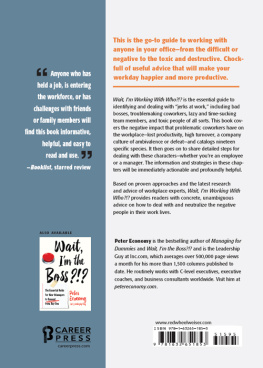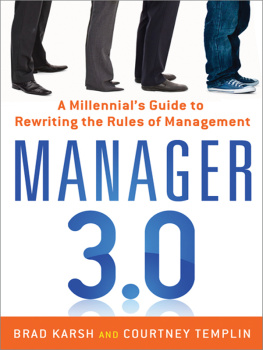

This edition first published in 2020 by Career Press, an imprint of
Red Wheel/Weiser, LLC
With offices at:
65 Parker Street, Suite 7
Newburyport, MA 01950
www.careerpress.com
www.redwheelweiser.com
Copyright 2020 by Peter Economy
All rights reserved. No part of this publication may be reproduced or transmitted in any form or by any means, electronic or mechanical, including photocopying, recording, or by any information storage and retrieval system, without permission in writing from Red Wheel/Weiser, LLC. Reviewers may quote brief passages.
ISBN: 978-1-63265-164-8
Library of Congress Cataloging-in-Publication Data available upon request.
Cover design by Kathryn Sky-Peck
Interior by Maureen Forys, Happenstance Type-O-Rama
Typeset in Crimson Pro, Drina, and Aquawax Pro
Printed in Canada
MAR
10 9 8 7 6 5 4 3 2 1
www.redwheelweiser.com/newsletter
To my children:
Jack, Sky, and PJ
Acknowledgments
M any thanks to the Career Press team, including Michael Pye, Jane Hagaman, Maureen Forys, and Rebecca Rider. In addition, I could not have created this book without the stellar efforts of my literary agent Jill Marsal of Marsal Lyon Literary Agencythanks so much for all your expert efforts on my behalf.
Thanks also to Kevin Daum for introducing me to the fine folks at Inc.com several years ago. It's been quite a ride!
And thanks to my personal editor and writing muse on this project, Sheila Wagner, for your support and stick-to-itiveness. I really appreciate it.
Finally, thanks to my wife, Jan, for putting up with my crazy, 24/7 writing schedule. This too shall pass. Aloha au i oe. Maui n ka oi!
Table of Contents
Introduction
Management is, above all, a practice where art,
science, and craft meet.
HENRY MINTZBERG, management professor
C ongratulations! You have been selected to be a manager in your organization. As you begin your leadership journey, know that you have been chosen for good reasons. Your boss has seen potential in you as a leader and believes you have what it takes to move your organization forward.
And, make no mistake about it. Managers make a very real difference in their organizationsthey bring the weather. According to research conducted by consulting firm DDI (Development Dimensions International), organizations with high-quality leaders are thirteen times more likely to outperform their competition. Not only that, but DDI's 2018 Global Leadership Forecast reported that the top two challenges for organizations today are (1) developing Next Gen leaders and (2) attracting/retaining top talent. It's therefore in the interest of your organizationof every organizationto identify, train, and develop high-quality managers.
Managers like you.
But there's a problem. Most organizations do not train their new managers.
According to an article in the Harvard Business Review by Jack Zenger, CEO of leadership development consultancy Zenger/Folkman, on average, managers first get leadership training at In other words, they receive no training in how to lead others for more than a decade after they were assigned the job of doing so.
According to Zenger, three specific problems arise when new managers aren't given the training they need to do their joband to do it well:
- Practicing without training ingrains bad habits. Although it would be great if every new manager automatically absorbed good habits from their manager, the simple truth is that lots of bad managers are out there. And these bad managers make poor role models. In fact, researchers have found that over 35 percent of professionals have quit their job because of a manager, and 15 percent of professionals are considering quitting their job because of their manager.
- Practice makes perfect only if done correctly. The old saying practice makes perfect doesn't really mean much when you're practicing bad management. If you haven't been trained in how to be an effective manager, then you could very well be practicing the wrong approaches to management.
- Your young supervisors are practicing on the job whether you've trained them or not. The simple truth is that when you're put into a management position, you'll try to be a managerwhether or not you've been trained to be an effective one. Again, chances are, bad management habits are being practiced and supervised employees aren't at all happy about it. This can have all sorts of negative effects on employees and the organization, from lowered morale, to decreased engagement, to increased absenteeism, and much more.
So, what can you do if you're a new manager who hasn't been offered any training in how to lead or be a manager?
Read this book. And then put what you've read into practice.
This book is a complete guide to all the things you need to know as a manager. And, although it's written with the new manager in mind, it can also serve as a useful refresher for any manager, no matter how experienced they may be.
Although technology and changing demographics have transformed the workplace in remarkable ways over the past several decades, the basics of managing others have largely remained the same. Employees know what they want from their managers, and they definitely know what they don't want. In 2018, LinkedIn Learning released the results of a survey of nearly 3,000 professionals who were asked this question: What is the single most frustrating trait you have experienced in a manager? These four specific traits of bad bosses rose to the top:
- Having expectations that aren't clear or that frequently change (20 percent)
- Micromanaging (12 percent)
- Being aloof and not involved (11 percent)
- Not fostering professional development (11 percent)
In an article on LinkedIn explaining these survey results, leadership training expert Elizabeth McLeod weighed in on the #1 trait of bad bosses:
A lack of clear expectations is the root cause of poor performance. Leaders often think they're clear, but the data tells us a different story. Employees need to know why this matters (the purpose) and what good looks like (performance expectations). Show me a leader who says, I shouldn't have to tell them, it should be obvious, and we'll show you a team that isn't clear.
This book is all about learning how to be a good bossan effective, perhaps even great manager and leader. I hope you get as much out of this book as I put into it. For further insights into management and leadership, please take a look through my more than 1,500 articles on Inc.com (The Leadership Guy): https://www.inc.com/author/peter-economy.
I wish you well on your journey as a new manager!
PART I
SO, YOU'RE NOW THE BOSS
To add value to others,
one must first value others.
JOHN MAXWELL,
leadership author and speaker
B ecoming a new manager can be a nerve-racking and confusing experience for anyone who has never supervised or managed others. That, however, does not need to be the case. Anyone can become an effective manager given the right tools and some experience. In this Part, we will explore the basics of becoming an effective manager and creating a high-performing organization. Topics include
- What managers do
- Setting goals
- Measuring and communicating employee performance









![Karsh Brad - Manager 3.0 A Millennials Guide to Rewriting the Rules of Management [[Elektronische Ressource]]](/uploads/posts/book/99578/thumbs/karsh-brad-manager-3-0-a-millennial-s-guide-to.jpg)


